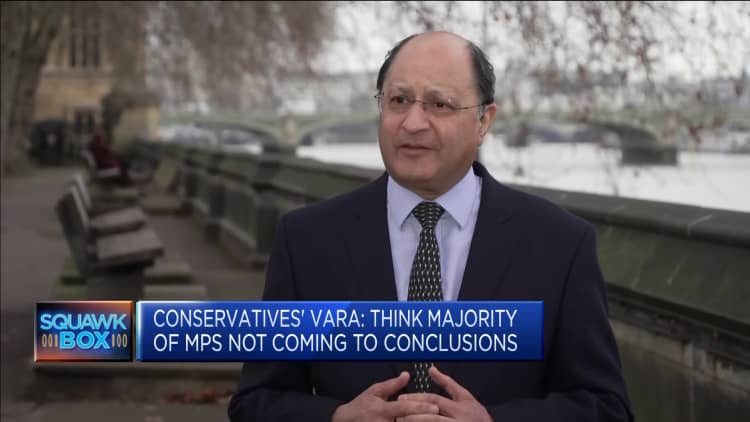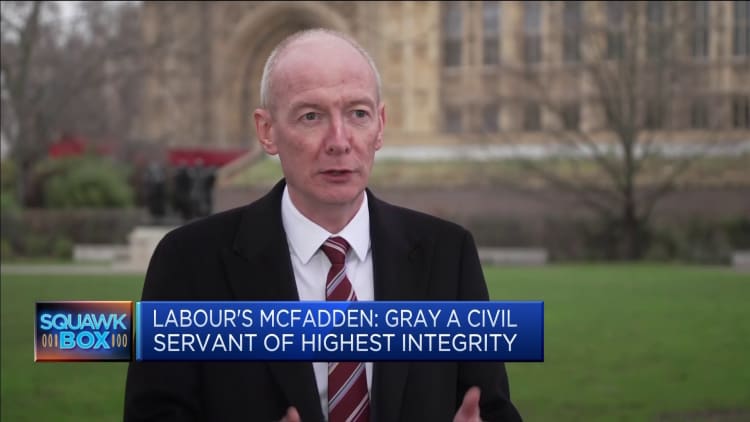LONDON — Economists expect the Bank of England to hike interest rates consecutively for the first time since 2004 as the central bank looks to steer the U.K. economy through persistent high inflation.
The Bank fired the starting gun on rate rises in December, hiking its main interest rate to 0.25% from its historic low of 0.1%. Since then, data has shown U.K. inflation soared to a 30-year high in December as higher energy costs, resurgent demand and supply chain issues continued to drive up consumer prices.
The December rate hike came despite the omicron Covid-19 variant spreading rapidly throughout the U.K. and threatening to destabilize the economic recovery once again. However, the Covid outlook has improved in recent weeks, compounding anticipation for a 25 basis point hike on Feb. 3.
"If December's surprise rate hike decision taught us anything, it was, firstly, that the Bank – and especially Governor Andrew Bailey – is clearly worried about elevated rates of headline inflation and the risk of a virtuous wage-price cycle," James Smith, developed markets economist at ING, said.
Smith suggested that the high-frequency data points to only a "modest and short-lived" economic impact from omicron, making a 25 basis point hike to 0.5% the most likely course of action.
A 'less hawkish' high
Deutsche Bank also expects a 25 basis point increase, and senior economist Sanjay Raja expects the Monetary Policy Committee to vote unanimously in favor of such a move.
"With the Bank Rate reaching 0.5%, we expect the MPC to confirm that all APF (asset purchase facility) reinvestments will cease following the February decision," Raja said in a note Thursday.
"This would see roughly GBP 28bn of reinvestments (~3% of APF) fall out from the Bank's balance sheet next month with a further GBP 9bn dropped over the remainder of the year."

Raja expects the MPC's primary message to be that more modest tightening will be necessary to keep the economy stable, with economists now expecting inflation to peak at 6.5% and take longer to moderate, remaining above the Bank's 2% target in two years' time.
"Worries around rising wage expectations and thus services inflation, alongside lingering supply chain pressures should give the MPC further ammunition for more rate hikes over the next several quarters," Raja said.
What's more, Deutsche Bank expects the MPC to highlight the wide confidence bands around the inflation outlook.
"The jump in inflation, and particularly energy bills, should weigh on future demand. Tightening global financial conditions should also restrain global growth, and therefore U.K. external demand, and rate rises should also push up borrowing costs for households and firms, tempering GDP growth," Raja said.
"We continue to see the MPC projecting excess supply at the very end of the forecast horizon (three years' out), with inflation sitting below the Bank's 2% target and the unemployment rate edging up as a result."
This would enable the Bank to stick with a message of only "modest" tightening, and Deutsche sees another 25 basis points hike in August, followed by further hikes in February 2023 and August 2023, taking the Bank Rate to 1.25%.
BNP Paribas brought forward its call for the next hike from May to February as the Covid situation has improved and inflation continues to run even hotter than expected. The French lender's economists similarly do not believe the MPC's messaging will introduce any additional hawkishness, and also expects a 25 basis points hike on Thursday.
"In doing so, we expect the monetary policy committee to kick start the process of balance sheet reduction," BNP Paribas economists said in a note on Wednesday.
"Still, the MPC is likely to be less hawkish next week than the action alone would imply, while we remain of the view that it will deliver a more gradual pace of rate hikes than is priced into markets."


